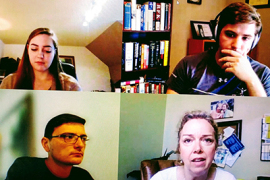Here's Why Christians Should Engage with Hollywood, According to Industry Expert
Christianity and the film industry have long had a complicated — and sometimes hostile — relationship with one another. Christians have often felt as if their ideas were at odds with Hollywood, denouncing the crude language, illicit sex, and violence prevalent in films today. In turn, Hollywood has historically failed to understand what resonates with the faith community, as seen in the colossal box office failure of “Noah.”
But instead of retreating from the entertainment industry, Stephan Schultze, executive director of the cinematic arts department at Liberty University, encourages Christians to become active participants in it. Doing so, he argues, will have a profoundly positive influence on the creation of cinema and impact Hollywood with the Gospel.
“[The film industry] has great potential to shape culture,” he said, explaining that filmmakers have an obligation to be cognizant of the worldview they’re presenting in their work.
“But it can go awry and in the wrong direction and affect culture in an inappropriate way...filmmakers design and create content that drives traffic to their movie in order to make the next movie. When the film industry is least healthy, it’s driving traffic in a way that’s unproductive for us to engage in conversation and to care about one another, or it’s successfully violent and dehumanizes what it’s like to be a human.”
Schultze speaks from experience. An active industry professional, both as a writer and cinematographer, he’s contributed to projects directed by legendary filmmakers including James Cameron and Ron Underwood. He’s also worked in every aspect of the industry including major motion pictures, television, music videos, commercials, industrial videos, and countless independent films.
In his multi-decades long career, Schultze says he’s learned an important truth: Whether you’re a filmmaker, director, or writer, how you treat someone next to you will end up on the screen. This provides Christians with an incredible opportunity to impact culture and engage others for the sake of the Gospel.
“At the end of the day in the film industry, you attract what you’re like. If you’re kind, you attract people who want to work with you,” he says. “If you’re quick to anger, if you’re cavalier in your personal life, and you bring that onto a set, that it is what you end up with at the end of the day.”
“If you're someone of the faith, how you demonstrate your faith...when it’s really hard, when you're really pushing through a difficult moment...it’ll reflect extremely well in your opportunity to have someone say, ‘Wow, you're different, what's different about you?'” he continues. “That's what we try to emulate. We tell our students, ‘You have this great opportunity, and it’ll show up when it's the hardest day you ever had, and that’s the day you can’t let that down. That’s the day you’ve got to push forward in a way that separates you from the pack.’”
As a professor, Schultze works to ensure his students grasp the necessary soft skills — communication, integrity, and teamwork — to help them thrive in their careers as filmmakers.
“We try to create a very supportive atmosphere. That builds integrity and teamwork as students learn how to identify, ‘This is where this person might need my help because they’re weak in this area — here’s how I can build them up,’” he says. “They start learning those skill sets because they may have their own need in another area. They start learning how to build each other up. This will help them far beyond the film industry; it will help them in relationships, in marriage, in raising children, and doing all the things they’ll continue to do once they graduate with a degree.”
He also teaches students the importance of surrounding themselves with like-minded individuals who are focused on the same goals.
“The people you’re around should be important to you and should reflect who you want to be around, what you want to emulate, what you want to put out in the world, how you want to influence people,” he said. “You should always be looking for that like-yoked person to do work with.There’s a value, since you spend so much time with those people, having those people bring joy to your life just the same way your family might or a best friend might.”
With world-class professional training facilities and equipment, Liberty’s cinematic arts program provides conceptual and practical experiences to ensure students are well-equipped to enter the world of filmmaking. Upon graduation, every student will have completed a film or a group project designed to meet the standards of international distribution.
“It’s exhausting work, it’s long hours, they need to have a certain skill set going into the workplace that allows them to be efficient, anticipate need, and have a strong, hard work ethic,” Schultze explains. “It’s very labor intensive. The first thing that would happen, if they didn’t have the skill set, is that they’d be fired quickly and be replaced overnight.”
The power of cinema is significant in society, and by incorporating moral values in movies and television, Schultze believes Christians can make a lasting difference in the mainstream entertainment industry.
“Even if they’re not Christian, [filmmakers] should have a mature moral compass, and we want to develop students who have that,” he contends. “In the film industry, there’s potential to be cavalier about the value of creating content that allows young people to understand...respecting life and dignity and kindness and reaching out your hand to your brother. I think all of those things are important.”
>>>Request for Liberty University Online degree info now.





